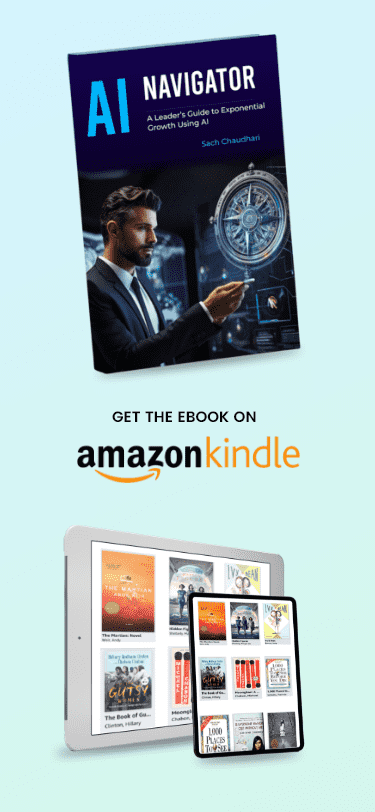In 1950, Alan Turing asked, “Can machines think?” It was then that AI was born. Fast-forward to 1956, when the term “Artificial Intelligence” was coined at the Dartmouth Conference. Since then, AI has grown from the ELIZA, developed in the 1960s, to high-profile systems, such as IBM’s Deep Blue, which in 1997 defeated chess champion Garry Kasparov, showcasing AI’s capability to outthink the human mind.
We stand at the threshold of a new age in which intelligent systems begin to work with humans to solve some of the most daunting problems of our time. AI consultants simplify this shift by bridging the gap between complex AI technologies and business needs. By understanding AI’s capabilities and an organization’s specific needs, AI consultants ensure that AI implementations are practical and aligned with business objectives.
We stand at the threshold of a new age in which intelligent systems begin to work with humans to solve some of the most daunting problems of our time. AI consultants simplify this shift by bridging the gap between complex AI technologies and business needs. By understanding AI’s capabilities and an organization’s specific needs, AI consultants ensure that AI implementations are practical and aligned with business objectives.
The Concept of the "Last Invention"
What do we mean by “last invention”? That AI might, at a stage, be intelligent enough to improve and innovate by itself, so there will be no further need for human invention. This view is closely connected with the notion of a technological singularity: a hypothetical future period during which AI will have achieved greater-than-human levels of intelligence, and the growth rate will become very rapid and unperturbable.
We stand at the threshold of a new age in which intelligent systems begin to work with humans to solve some of the most daunting problems of our time. AI consultants simplify this shift by bridging the gap between complex AI technologies and business needs. By understanding AI’s capabilities and an organization’s specific needs, AI consultants ensure that AI implementations are practical and aligned with business objectives.
The implications of reaching such a point are vast and multifaceted. On the one hand, it could result in solutions to some of humanity’s most pressing problems, such as early disease diagnosis, climate change, and poverty. On the other hand, huge ethical and existential issues relating to control, safety, and what humans would be doing in a world with intelligent systems. We stand at the threshold of a new age in which intelligent systems begin to work with humans to solve some of the most daunting problems of our time. AI consultants simplify this shift by bridging the gap between complex AI technologies and business needs. By understanding AI’s capabilities and an organization’s specific needs, AI consultants ensure that AI implementations are practical and aligned with business objectives.
Industries That Have Adopted AI at a Scale
Healthcare
AI is changing healthcare in ways people couldn’t have imagined by providing early diagnosis of disease and providing plans for treatments in a personalized manner. AI can accurately evaluate medical images and patient data using advanced algorithms more often than human doctors.
When relating to diseases such as cancer, early detection is a crucial factor since timely intervention will be a factor amplifying the patient’s outcome. Not only the application of AI in determining treatment but also the individualization of a treatment plan for an individual according to the course that his medical history and genetic profile may follow increases the efficacy of the therapies, the individual side effects, and the optimization of patient care. We stand at the threshold of a new age in which intelligent systems begin to work with humans to solve some of the most daunting problems of our time.
AI consultants simplify this shift by bridging the gap between complex AI technologies and business needs. By understanding AI’s capabilities and an organization’s specific needs, AI consultants ensure that AI implementations are practical and aligned with business objectives.
“Want to start with custom AI development? Contact us and get started”
Environmental Sustainability
In addressing the challenges of the environment, AI plays a vital role in the mitigation of climate change-related issues and the management of resources. The help of advanced models can make infallible predictions on climate patterns, which would help in planning strategies for fighting the adverse effects of climate change. This proactive approach helps in devising more effective solutions for global sustainability.
In addition, AI optimizes the use of natural resources, notably in aspects like agriculture and energy, which optimize waste and improve efficiency. This technological intervention ensures that resources are utilized responsibly to pave the way for a better future.
Educational Institutions
Artificial intelligence will redefine learning by enabling a personalized learning experience and administrative efficiency. AI-powered platforms, including AI chatbots, will be able to calibrate the style and speed of learning that is just the right fit for individual students, providing a tailor-made journey based on the learner. Aside from that, AI performs administrative duties every day, such as grading and scheduling.
This takes the burden off educators, leaving them with the responsibilities of teaching and mentorship to the students. AI chatbots can also assist in answering students’ queries in real-time, providing instant support and resources, further enhancing the learning experience. This transformation improves the quality of education and the learning process.
“Want to integrate AI in your business processes? Buy our book AI Navigator: A Leader’s Guide to Exponential Growth Using AI authored by our founder Sachin Chaudhari”
Financial Services
In the financial industry, AI boosts both fraud detection and investment strategy. To a great extent, artificial intelligence systems can analyze vast amounts of transaction data in real time and detect and prevent fraudulent activities, thus providing substantial defense against financial crimes.
This real-time analytic system will help detect and protect a financial institution and its clients from financial crimes. Even further, by dealing with the study of market trends and data, AI allows for advanced investment strategies that return the highest possible result for investors and more significant investment into financial markets.
Manufacturing and Automation
AI is now changing how manufacturing is approached through predictive maintenance and quality control. AI can save lots of time and money on repairs and outages by detecting when machinery will eventually break down. When the manufacturing machinery runs without any failure, it ensures proper and efficient running in manufacturing.
This predictive ability helps companies avoid costly yet disruptive dredging while continuing production. In addition, such AI-based quality control systems can examine the products for any defect more precisely and quickly than any human inspector, ensuring that only top-quality products reach the market.
No change in business processes even after employing AI? Contact our AI consultants for quick resolutions!
Current Challenges and Risks
Ethical Concerns
Strong ethical concerns include the bias, discrimination, and privacy issues it raises. For example, AI systems can inherit biases from their training data, leading to unfavorable results and reinforcing social inequalities.
On the other hand, AI relies heavily on collecting and analyzing vast amounts of personal data, which creates serious concerns regarding privacy and its possible misuse or unauthorized access. We stand at the threshold of a new age in which intelligent systems begin to work with humans to solve some of the most daunting problems of our time.
AI consultants simplify this shift by bridging the gap between complex AI technologies and business needs. By understanding AI’s capabilities and an organization’s specific needs, AI consultants ensure that AI implementations are practical and aligned with business objectives.
Job Displacement
With AI increasingly being made to perform tasks in an automated manner, there is the fear of impending job loss in the manufacturing and customer service sectors. Job losses from automation might be significant.
Hence, the prerequisite condition of reskilling or upskilling programs to enable the workers to fit into newer roles created by AI. Those shall require strong policy interventions and educational initiatives.
Control and Safety
This is a vast challenge, but human needs are of high concern. Significant issues arise from ethical and safety concerns in military applications of AI, including the design of autonomous weapons. This requires extreme caution, and there should be very rigid supervision and control mechanisms to avoid possible incidence or misuse.
Transparency and Accountability
AI systems are criticized for being “black boxes” that hide their decision-making processes, and accountability is not straightforward if an error or harm arises. Setting clear guidelines and regulations where responsibility must be defined is important to ensure the responsible use of AI.
Malicious Use
The potential malicious use of AI is already being seen in cybersecurity and misinformation, whereby AI is taught to produce advanced cyberattacks and misinformation in the form of deep fakes; thus, the call for security precautions and public education to meet such risks is elevated.
Click here to build your first AI-powered chatbot and make customer query easy to handle.
Conclusion
While one can hardly deny the potential of AI to solve some of the most intractable problems in the world, it also opens challenges of an entirely new order for the simple reason that AI has brought them to the very doorsteps of our nature as creators and caretakers of technology. In that case, what will be the space of human ingenuity concerning the ability of AI to innovate itself? Are we going to be architects of a utopia in which AI develops to continue enhancing every phase of our lives, or will we eventually become observers while our own creation surpasses us?
The journey from Turing’s simple question to the possibility of a technological singularity is more than just a timeline of advancements—it is a narrative that forces us to confront the limits of our control and the ethics of our ambition. In the end, AI may not be just another invention but the final test of whether humanity can wield its power with wisdom. As we foster the development of machine capabilities, we must not overlook whether we are either truly ready to embrace this future—which we are creating—with open arms, or are we stepping into the unknown, where the consequences are far-reaching and beyond our control? These questions will define a future not only of AI but of humanity itself.










